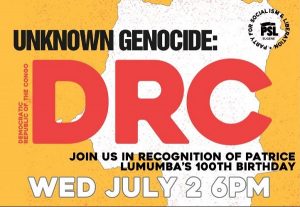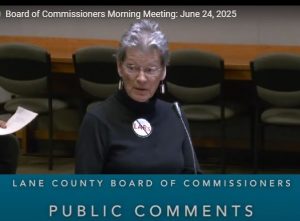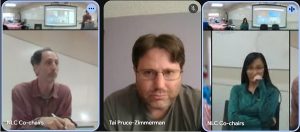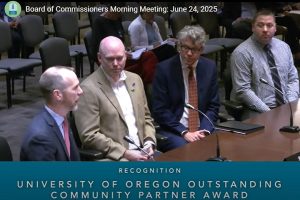Council asked to let public decide on STAR voting
22 min read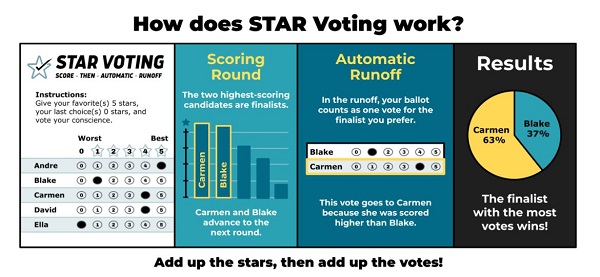
Eugene voters will choose in May 2024 whether the mayor and city council will be elected using a method called ‘Score Then Automatic Runoff’—STAR voting.
But first the council has an opportunity to weigh in on the ballot measure. The council can choose to: support STAR voting; oppose it; offer its own alternative; or remain silent and leave the issue to the voters.
At the Dec. 11 public forum, 17 supporters of STAR voting made their case to the city council:
Susan Hirata: Hi, my name is Susan Hirata. This summer and fall I was a volunteer canvasser for STAR voting. One of the positive things about gathering signatures is that we are out in the community directly engaged in having conversations with Eugene voters.
[00:00:43] In the months of talking to folks, I found that people are concerned about our current voting system. Some had heard about STAR voting and couldn’t understand why it wasn’t on the ballot the first time. Some were aware and concerned about voting problems in other states, particularly in Maine and Alaska and some of the problems with their voting system.
[00:01:03] And they wanted to talk about that. And many, in fact, had not heard about STAR voting and were curious enough to ask questions and have a conversation with me. After a 10-second explanation that I gave about STAR voting, the majority were really encouraged by this voting method. The process makes sense to them.
[00:01:24] They liked that it was a scoring method and that the voter is able to give a nuanced vote across the slate of candidates.
[00:01:32] Some said, ‘Well, actually, this is really interesting. I’m really interested in this, but I never sign petitions. So I’m not going to sign your petition, but I’d love to take your information. I’m going to look at it some more and I’m going to talk to friends about it and more people in the community about it.’ So there’s definitely interest in the community. People understand that voting is the cornerstone of our democracy.
[00:01:56] They want their vote to count and they want their voice to be heard. They want a change and STAR voting intuitively makes sense and appeals to them. Thousands of gathered signatures show that the electorate wants to vote on this. I encourage councilors to meet with STAR voting team if you have any questions or concerns about STAR voting and they can give you all the information that they have.
[00:02:24] And one last side note in the community, I help run a social justice film festival and every person in the audience who watches a film is given a ballot to vote for the audience choice of that film. So it’s easy. Everybody knows how to do it. It’s zero to five. You score each vote, each film that you see.
[00:02:47] City of Eugene: Our next speaker is Michael Curtin.
[00:02:49] Michael Curtin: Basically what I’m here tonight to ask, is that the council make a motion to cancel the later work session to oppose STAR voting. So that people have the opportunity to vote for it and that the council not actively oppose the people who brought forth this proposal. I don’t have a whole lot more to say. Just please don’t fight with it. Just listen to what we’re asking for.
[00:03:20] City of Eugene: Our next speaker is Scott Fife.
[00:03:21] Scott Fife: I voted for the STAR voting the first time and I’ve supported it almost forever. I was at the Green Party convention in 2000 and we’ve been calcified into this two-party system and there’s got to be a way where we can break it because it’s like: The corporations have two parties, don’t we get at least one?
[00:03:38] I can’t believe the city council is waffling on this because I remember when we wanted to have a city auditor and they brought up an alternate proposal to confuse the electorate and that sounds like that’s what you want to do this time.
[00:03:53] And it’s like, all these MUPTEs (Multi-Unit Property Tax Exemption) we’ve been passing left and right, you know, basically, the taxpayers are subsidizing concrete production, which is the third-largest emitter of greenhouse gases behind China and the United States, and we have to pay for it.
[00:04:08] Now you’ve got a seven-story monstrosity right by the river that we’ve subsidized. And, you know, we didn’t get a vote on that.
[00:04:16] I don’t know how you people could do this. You said, ‘Well, you know, we had to.’ They came by with those three special words, ‘Won’t pencil out,’ what they’ve all used. They said, ‘Well, it won’t work because if we don’t give them the tax subsidy, a 10-year tax subsidy for 10 years,’ you know, that they don’t pay taxes.
[00:04:33] And I remember when Whole Foods wanted to move in here, they wanted to have some corporate welfare and people stood strong and said no, and guess what? They moved in here anyway.
[00:04:45] And with the building boom that’s going on, crazily, you actually believed that without their 10-year tax break, they weren’t going to build that seven-story monstrosity right by the river.
[00:04:56] I’ll tell you. I don’t know. We’ve got to break the system. The Republicans have been in there since Lincoln and the Democrats have been in there since the founding of the country and I’m sick of both of those parties.
[00:05:08] I want to see the STAR voting. I want to have a choice of who I can vote for and not just have it as two-party. I’m sick of the whole spoiler thing.
[00:05:17] We’ve got in other places. They’ve got it in Maine. They’ve got it in San Francisco.
[00:05:21] City of Eugene: Our next speaker is Mark Osterloh.
[00:05:23] Mark Osterloh: I’m here to speak about STAR voting. I’m urging the city council to step away from making any proposal or taking a stand for Oregon STAR voting. STAR voting was invented in 2014 over here at the University of Oregon, where about 100 voting experts from all around the country came together and they had one question: What’s the best way to vote?
[00:05:45] They looked at all the systems, they didn’t like any of them, and they invented STAR voting at that time.
[00:05:50] And for the last nine years, they’ve done statistical analysis at Harvard, peer-reviewed journal articles, and they’ve tried to game the system every way that they could. And their conclusion is this is the best way to vote and our current system is the worst.
[00:06:04] We have collected the signatures to get on the ballot. I don’t believe this is an appropriate position for you to take a stand on. The people want to vote on this and say what they think. This was invented by experts. I don’t see a voting expert standing up here that have, or political science teachers or people that have done peer-reviewed articles on this one.
[00:06:28] If we pass this here in Oregon, it’ll be the first place in the country. It can be a model for the whole country. I collected over 3,000 signatures in front of the Department of Motor Vehicles, and I talked to probably more people face-to-face that are voters in this city than you did in the last three months.
[00:06:48] And time and time again, people said, ‘We’ve got to change.’ It stinks right now. We’ve got the Democrats and Republicans. And it really stinks the way we’re having problems right now. This is the opportunity for that to change. Let the people speak. If we pass it here, it’ll be a model for the whole country. We could actually be a model for the entire world.
[00:07:09] And democracy is in the bad way right now. I appreciate your time and I hope that you will let the people stand and vote on this one and let them make the decision. Don’t want to have to have the city council be considered the boogeyman in this situation if they try to do something to muddy the waters.
[00:07:31] Jacob Trewe: Hello there everyone. My name’s Jacob Trewe. I’m here supporting STAR voting. First and foremost, I think it’s an excellent way to go forward.
[00:07:37] One of the best aspects of it compared to rank choice voting or indeed first-past-the-post voting is that it’s very hard for you to mess up your ballot and have your ballot invalidated. This increases the ability for folks to have their voice actually heard, and all you’ve got to do is rank your preference.
[00:07:51] If you like a certain candidate quite a bit, give them a five. If you don’t like them so much, give them a two or three. If you don’t like them at all, give them a zero. If you leave them blank, it counts as zero. It’s pretty darn simple system when it comes right down to it. It’s as easy as filling out a Yelp form. No, not all folks do that, but it’s pretty easy when it comes right down to it.
[00:08:06] I’m also a proud member of the Eugene Springfield Democratic Socialists. A part of why the Democratic Socialists have endorsed this is because we believe in democracy. And the best way for that to actually be reflected is having a voting system that actually works.
[00:08:18] Justin Russell: Hello, my name is Justin Russell from West Eugene. I’m here to demand that Eugene City Council not waste their time trying to oppose STAR voting. I’ve heard rumors that you intend to host a work session to consider opposing Measure 20-349, and I remember the underhanded tricks that were pulled last time STAR voting got enough signatures to be put on the ballot.
[00:08:35] I am a nobody. By virtue of being nobody, I represent everybody that does not care enough to take part in the broken political system America has concocted for itself.
[00:08:44] This is my first time writing or reading a script or speaking publicly, and I hope I have enough time to finish it. This is the first time I’ve cared enough to do any of this, and that should speak volumes. The two-party dilemma we live under is propped up solely and only by the first-past-the-post voting structure.
[00:08:58] Its spoiler effect, among its many other critical failures, has always and will always guarantee that any election that contains a promising third-party candidate will split the votes of one wing of our political spectrum and cause the less popular wing to win. This vote-splitting has created damage beyond repair to every aspect of our politics.
[00:09:16] In 2016, Bernie Sanders split the left vote, causing Trump to win over Hillary. Exit polling shows that without the spoiler effect, Sanders would have won the election. This is how we got the Proud Boys. In 2000, Ralph Nader split the left vote, causing Bush to win over Al Gore. Polling shows Nader’s voters would have voted Gore into office.
[00:09:34] This is how we got the war in Iraq. In Germany, 1925, Ernst Thälmann split the center vote, causing less popular Hindenburg to win over Wilhelm Marx. A hundred years of study shows that without that spoiler effect, Hindenburg would never have been in a position to appoint Adolf Hitler. This is how we got the Nazis.
[00:09:51] STAR voting is the product of decades of research by the smartest people we have on the job and is the simplest to understand, most effective way to stop the problem once and for all. The people of Eugene have decided to put this to practice and put it on the ballot, and I hope you recognize how important this is because this is how we stop the Nazis.
[00:10:07] Growing up on the brink of poverty, my family lived cross-country in a run-down motorhome, my father laboring far too much to avoid neglecting his kids, all for the sake of achieving the American dream and bringing us up. From hauling our own waste in a bucket, to owning our own home in West Eugene, to selling his hand blown glass as fine art in Sotheby’s Auction House.
[00:10:23] Trust me when I say that we have met a lot of very different people with very different opinions in a lot of different places, high and low. I tell you this to give weight to our confidence that we know every real person, in that everybody I represent, would, if given a real meaningful choice, would always vote for that better third option that we otherwise are scared to support. STAR voting gives every voter that choice.
[00:10:45] City of Eugene: Our next speaker this evening is Emma Scott Lavin.
[00:10:48] Emma Scott Lavin: Hello. We have collected over 3,000 signatures for STAR voting. I want to propose a question to you. If you had a choice to take an action that would save democracy, but at the same time might risk your own personal political career, what would you choose?
[00:11:04] I want profoundly to trust you. I’d like to see a show of hands of how many people in this room really profoundly want to trust our city council.
[00:11:18] So, I understand that there’s a claim on the table: ‘STAR voting is confusing.’ And that for that reason, there might be reason to support a countermeasure to support the status quo. There’s already a measure on the ballot to support the status quo, and that is the opportunity to vote no on STAR voting. So my question is: What is the purpose of the claim that STAR voting is confusing?
[00:11:51] I really profoundly want to trust all of you and everyone in this room wants to profoundly trust you. And I also want to suggest that, well, if you take an action that risks your own political career, but saves democracy: How many people in this room think that actually doing so would actually risk your political career? Can I see a show of hands. (laughter)
[00:12:17] Do the right thing. Let us vote on STAR voting and let us speak our choice clearly, loudly and boldly. Saving democracy or not is really what’s on the line here. And if we lose our democracy, people like me—Look at me, I’m ridiculous, right? I, if we lose our democracy, may lose my life.
[00:12:43] Jonathan Miller: My name is Jonathan Miller. In 2013, after traveling all over the country, searching for that perfect new city to call home, my wife and I chose Eugene, a city that is building for the future…a progressive place that’s continually creating policies that other cities hope to emulate. In essence, we chose Eugene as our home because it’s the kind of city that can make STAR voting happen.
[00:13:08] In the coming years, as our technology evolves and climate crisis worsens, you as a council will have to decide on some of the most complex issues you’ve ever faced. We need a democracy that can keep up.
[00:13:19] Why let us vote for only one choice when we can just as easily tell you how we feel about every choice? It’s simple, saves money, best represents the wishes of the voters, and future-proofs our democracy to tackle these big issues. Moreover, STAR voting started right here in Eugene and will serve as an example for other progressive cities who want to move our democracy forward at the local level and beyond. People will look at this simple yet meaningful revolution and democracy and know it all started here in our city.
[00:13:47] I know some of you may want to look at a voting method at odds with STAR voting. But the good news is the good people at Equal Vote Coalition has already done years of research and all that work for you.
[00:14:00] You’re busy and probably too busy. You want to represent the will of the voters who have clearly spoken.
[00:14:06] You want to maintain and elevate Eugene’s status as one of our country’s great cities. And it’s a city I’m so proud to call my home and if all of this is true, then you should endorse Measure 20-349 and implement STAR voting for Eugene elections.
[00:14:21] City of Eugene: Our next speaker this evening is Sigh O’Nara.
[00:14:23] Sigh O’Nara: My name is Sigh. I’ve looked in STAR voting. I really appreciate STAR voting. There’s no system worse than the first-past-the-post other than dictatorship. Really anything we can do to get past first-past-the-post, I’ll be thankful for.
[00:14:36] Wendy Cook: I’m Wendy Cook. So I’ll admit the first time I heard about STAR voting, I figured, ‘Hey, if it ain’t broke, don’t fix it, right?’ However, I am concerned that our current one choice voting system is, if not broke, at least struggling in an us-versus-them political straitjacket. So I did take the time to look at STAR voting as well as Ranked Choice Voting (RCV) and a few others for good measure.
[00:15:02] Unlike any other system I looked at, I found STAR voting offers a way to vote more expressively, more true to my values, and have the most say as I do. I like that very much. No matter where you land on the political spectrum, each of us wants to feel as if our vote counts. STAR voting is remarkably well structured to do just that.
[00:15:25] First, contrary to what some may fear, STAR voting is not confusing to use. As I think Jacob (Trewe) put, simply put, it works a lot like Yelp and, Yelp’s pretty easy.
[00:15:36] Second, STAR voting is more expressive. With our current system, we often feel like we have to vote for the candidate who annoys us the least if we want to have a say—at all.
[00:15:47] With ranked choice, you have to try to pick precisely who you like best, next best, and so on. And in real life, that’s hard to do. It feels forced. With STAR voting, you simply vote your true feelings about each candidate. Then STAR’s two-round tallying process incorporates your preferences. The stars are counted or scored.
[00:16:08] The two highest-scoring finalists go into an automatic runoff. And then your vote goes to whichever the two finalists received your higher score. This means you can give your favorite candidates your highest scores, even if they don’t stand a great chance. And yet you still have a say in the runoff among the two most popular vote-getters.
[00:16:28] That is powerful stuff. Council members, even if you’re not personally in favor of STAR voting, I do hope you’ll at least let the voters have a clean say on this. I urge you against using your position of power to add a competing measure on the ballot. And I urge you to talk to the STAR voting organizers because they love, love, love what they’re doing and they love nothing better than to inform and explain and probably do it in a way that doesn’t make their hands shake.
[00:16:57] Ashley Wright: I’m Ashley Wright. I’ve been watching the STAR voting saga go on for years. I’m surprised we don’t have it yet. I’m disappointed we don’t have it yet. Eugene clearly wants it. Please don’t get in its way.
[00:17:12] I’ve done plenty of canvassing in my life, not for STAR voting, but for other things. And I talked to plenty of people who, they don’t want to talk about anything. They’re like, ‘No, don’t talk to me. I’m, I don’t even vote. I don’t, I just want none of that.’ And I can’t speak for all of them, but I think part of it is that the first-past-the-post system is not very engaging. And STAR voting is very engaging.
[00:17:37] And your investment in first past the post is…suspicious.
[00:17:43] Erica Lyon: Hello, my name is Erica Lyon. At the last city council meeting focused on STAR voting, Mayor Lucy Vinis called it ‘a solution looking for a problem.’ This implies that there is nothing to be improved from our current voting system. Nothing could be further from the truth.
[00:17:59] As someone who has canvassed for STAR voting for five years, I have had a chance to talk to many voters about how they feel about voting. Many people who signed say they are sick of their vote not counting. What this means is that voters do not feel properly represented in politics. Instead of having a variety of viable options, voters often feel they are choosing between the lesser of evils. This is because our current system of choose-one-only voting forces voters to throw their entire weight behind one candidate, making them choose between the candidate they really want to win and the candidate that might not be their favorite but has a better chance of winning and isn’t their least favorite.
[00:18:35] STAR voting would solve this problem by allowing voters to support multiple candidates at once so that if their favorite doesn’t make it to the automatic runoff, all the scores you give to the other candidates will help them advance. So it’s not an all-or-nothing vote. This would allow the voter to vote more honestly and support the candidates they actually want to win.
[00:18:53] Another advantage of STAR that benefits both voters and elected city officials is that it eliminates the primaries, at least on a local level. This will save the city taxpayer money and the burden of administration. Local candidates will also be freed from the burden of running two campaigns, saving them money and allowing them to focus on their primary tasks of running the government.
[00:19:15] It would also save voters time and energy. Nonpartisan primary elections are notoriously low turnout. By eliminating these, the voter will be able to focus all their mental energy on the main elections, which tend to draw more voter interest. Besides that, Eugene voters are genuinely excited to see STAR voting on the ballot, as you see tonight.
[00:19:34] We are convinced of its benefits and are sick of the current system. The campaign collected over 10,000 ballot signatures. If the city councilors want to be in touch with their constituents, they should endorse STAR voting. It would make Eugene a trailblazer in Oregon, and indeed the nation.
[00:19:48] City of Eugene: Our next speaker is Carver Goldstein.
[00:19:51] Carver Goldstein: I’m Carver. Initiative and referendum is a way for the people to exercise their democratic rights about how policies should be passed and which policies should be passed.
[00:20:01] Now, I could speak at length about why I support STAR voting. But it doesn’t really matter what I think, and it doesn’t matter what the city council thinks. It’s the right of the people to decide if they want STAR voting. And trying to find an alternative and having this work session to find an alternative seems like an end run around democracy and a way to essentially muddy the waters and confuse the election.
[00:20:26] So I encourage the city council to cancel this proposed work session and let the people vote on STAR voting as is their right without interference from the city council.
[00:20:38] Sara Wolk: Hello, my name is Sara Wolk. I’m the executive director of the Equal Vote Coalition, a peer-reviewed and published author on voting reform, and a chief petitioner for STAR voting for Eugene.
[00:20:49] I couldn’t be more proud of what our team has accomplished here. As you know, this year, over 14,000 voters signed the petition to put STAR voting back on the ballot. What you might not know is that we had over 100 canvassers. 98 percent of our signatures were collected by Eugene residents. One-third of our signatures were collected by volunteers and our campaign spent pennies on the dollar compared to the controversial Holvey recall and gas bill initiatives—literal pennies on the dollar.
[00:21:17] STAR voting has huge public support in Eugene. A majority, 54% of Eugene voters, already supported the 2018 initiative and the world is looking to us to lead on this issue.
[00:21:27] I’m calling on council to do three things. One, please do not put a competing proposal on the ballot or oppose it. Council should not muddy the waters and obstruct the democratic process. Please let the voters compare STAR voting with the status quo and decide for themselves.
[00:21:44] I ask that at your next meeting, you move to vote to cancel the planned work session on this and take no further action as a group. Individually, you should support STAR voting.
[00:21:54] Please get informed. At the last work session on STAR, council asked a number of questions and raised a number of concerns as well as some misconceptions that are easily addressed. Here are a few, quickly.
[00:22:06] STAR voting was invented specifically to address the known flaws with RCV (Ranked Choice Voting) and better deliver on its goals. If you’ve heard about issues with voter error under RCV, STAR voting fixes that and it’s super user-friendly.
[00:22:18] If you’ve heard about delays getting results and issues with miscounts under RCV, STAR addresses that too. STAR voting is tallied with simple addition, and results would be available immediately.
[00:22:29] STAR voting tops the charts in terms of accuracy, and it’s safe to vote your conscience, as has now been shown in the peer-reviewed literature. I’d love to meet with each of you to talk through your questions and give you answers.
[00:22:41] Do we have any policy wonks on the council? Meet with me. Please take us up on the offer.
[00:22:46] And please stop saying that STAR voting is complicated. Yes, it’s new, but it’s not rocket science. It’s just one election in November, and it’s a five-star rating.
[00:22:57] Ben Smith: My name is Ben Smith.
[00:22:59] I moved to Eugene from New Zealand to take a psychology research job at UO. I research the psychology of decision making, but in my personal view, the first-past-the-post vote system encourages divisive campaigning because it forces elections into a two-horse race between the most popular candidate and the second.
[00:23:17] But STAR voting is a carefully designed voting system that takes that right out of elections. It makes campaign campaigning less acrimonious. Because candidates never have to worry about splitting the vote between allies because voters make up their minds and can vote for multiple candidates.
[00:23:35] The alternative voting system in Oregon that also allows multiple candidates is the ranked choice voting. It’s been quite divisive nationwide. I understand it was banned in Idaho, Florida, a few other states. In contrast, STAR voting is a homegrown method invented here in Eugene, it’s popular in Eugene and I understand, within the Eugene city limits it won a majority in the Lane County ballot initiative in 2018.
[00:23:57] And looking at the resistance Ranked Choice Voting is coming up with nationwide, STAR voting could get ahead, and Eugene could really set an example and be a trailblazer for the nation if it adopts STAR voting.
[00:24:12] Sass: My name is Sass and I’m the deputy director of the Equal Vote Coalition, a Eugene-based nonprofit that advocates for true equality in the vote itself through research and education. In May 2024, Eugene voters will have the opportunity to vote on Measure 20-349, which if passed, would establish STAR voting for all Eugene public elections.
[00:24:36] As a leader in voting method reform, I urge Eugene voters and city council to support this measure. STAR voting is a modern, simple voting method that empowers voters to vote both honestly and expressively while delivering highly accurate results and ensuring that every voter has an equally powerful vote.
[00:24:54] Under STAR voting, voters score candidates from zero up to five stars, giving their favorites five stars, their last choice is zero, and scoring others as desired. The two candidates with the most stars overall are finalists, and your one full vote automatically goes to the finalist you scored higher than the other.
[00:25:13] The finalist with the most votes wins! Not only would STAR voting requires zero hardware upgrades or major logistical changes to Lane County’s election system and process, this measure actually reduces costs and complexity under our current system in Eugene. There’s a nonpartisan primary in May for local offices.
[00:25:32] If one candidate gets over 50%. then they win the seat. Otherwise, the two candidates with the most primary votes go on to a separate runoff election in November. This is confusing, inconsistent, and forces primary campaigns to gamble on whether the November election will be consequential.
[00:25:48] This measure eliminates the low turnout primary in May and consolidates local races into a single general election in November when turnout is at its peak, simplifying the process and bringing consistency to our local politics.
[00:26:02] The charter amendment crafted by the STAR voting team is excellent, and Eugene voters will be excited to support this, as evidenced by the city’s 54% majority vote in favor of STAR voting when it was on the ballot countywide in 2018.
[00:26:14] Council, try as you might, there is no better voting system measure you could put on the ballot. There are other pressing issues to focus on right now. So Eugene City Council, please, cancel your work session on a competing measure.
[00:26:26] Sam Schall: My name is Sam Schall, asking you to stop and cancel plans for a work session on STAR voting.
[00:26:31] You folks on the council that opposed STAR voting claim that it’s too confusing for the general public to understand. But if you’re expecting having two opposing ballot measures on voting on a ballot to be easier to understand… (laughter)
[00:26:44] You know, I’m beating a dead horse here, but STAR voting is truly as simple as stated: Score your candidates, mail in your ballot. It’s also much easier than Ranked Choice Voting for election officials to deal with the data since it’s just addition.
[00:26:58] Updating the way we run elections is needed now more than ever. And opposing STAR voting because it’s different is like wanting the public to wear wooden clogs because tying their shoes is too big of a change that they won’t be able to handle.
[00:27:10] When STAR voting went to the ballot for Lane County, 54% of people in Eugene voted in favor of STAR. And we only gained more support and educated the public more on its benefits.
[00:27:20] If you openly oppose STAR voting, you’re more than welcome to put your name as the opposition on the ballot. But know it may cost you in the next election when people see your name as the opposition and people vote in favor of STAR.
[00:27:32] A plan to create an opposing ballot measure is such a blatant way to try to undermine a process that Eugene public worked really hard to get on the ballot and supports. It looks bad, smells bad, and will reflect on all of you councilors. Even if some of you support star, your name will still be attached that session knowing that that opposing ballot measure got to the ballot in that matter. It’s so easy to be against everything that these days and here’s a chance to be for something and champion it. So please stop and cancel the STAR voting work session.
[00:27:59] John Q: At the Dec. 11 public forum, 17 speakers support the STAR voting measure. It will appear on the ballot in May, 2024. The Eugene City Council can decide whether to support, oppose, offer its own alternative, or do nothing and leave it to the voters.
The Eugene City Council is scheduled to discuss STAR voting at noon on Wednesday, Jan. 10, 2024.
Update (Jan. 11, 2024): The Eugene City Council opted not to take a stand either for or against STAR voting at its Jan. 10, 2004 meeting.
